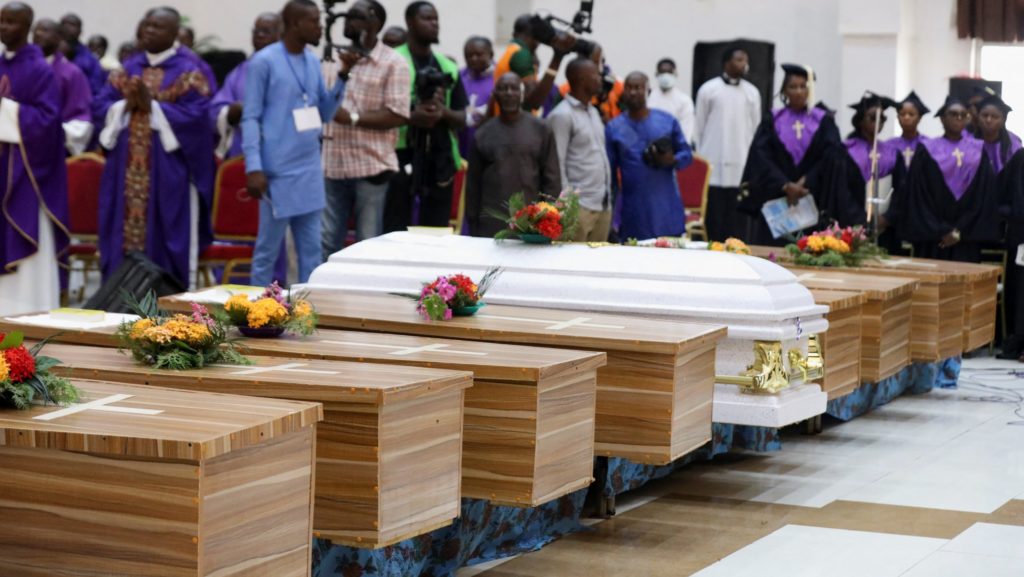Political satirist Bill Maher, who has often been a vocal critic of Christianity, recently called attention to the persecution of Christians in Nigeria, calling the ongoing violence a “genocide attempt.”
“I’m not a Christian, but they are systematically killing the Christians in Nigeria,” he said during the Sept. 26 episode of his HBO show “Real Time with Bill Maher.”
“They’ve killed over 100,000 since 2009. They’ve burned 18,000 churches,” Maher said, referring to violent Islamists in Nigeria such as Boko Haram.
“This is so much more of a genocide attempt than what is going on in Gaza,” he continued. “They are literally attempting to wipe out the Christian population of an entire country.”
“Where are the kids protesting this?” Maher asked.
The violent persecution of Christians in Nigeria “is underreported in Western media,” Religious Freedom Institute President David Trimble told CNA.
Trimble, commending Maher for raising the issue “to his mass audience, which may otherwise have very little exposure to such weighty issues,” noted that the “atrocities committed against Nigerian Christians can rightly be labeled as genocide.”
“Nigeria is the most dangerous place in the world to be a follower of Jesus,” Trimble said. “Over the last decade, Islamist extremists have killed approximately 4,000 Christians there annually.”
Since July 2009, more than 19,000 Christian churches have been destroyed or looted, while hundreds of clergy, including Catholic priests, have been kidnapped or attacked. Less than two weeks ago, a Catholic priest named Father Matthew Eya was murdered while returning from his ministry.
Edward Clancy, outreach director of Aid to the Church in Need USA, said that Christian persecution is at its height in Nigeria.
“It’s the area in the world where more Christians are killed for their faith than anywhere else,” Clancy told CNA.
“It’s amazing that it takes Bill Maher to become the voice of Christian persecution in the United States,” Clancy added.
Experts call the persecution a genocide
Christians make up about half of Nigerians, but they live in fear of persecution.
“Shocking levels of violence have persisted for years,” Trimble said.
Christians experience frequent violent attacks, especially those living on farms in small towns on the outskirts of the north central state of Benue, which is predominantly Christian. Their farms are often burned to the ground during these attacks, destroying their livelihoods.
“They attack small towns and devastate them to the point that people need to abandon their homes, and then they’ll destroy and burn what’s remaining,” Clancy said. “It just demolishes the whole community.”
Because of the destruction, many parishes have been forced to close. In the Diocese of Makurdi in Benue, at least 16 parishes have been abandoned due to the violence, according to Clancy. As each parish has multiple locations, this translates to roughly 40 churches.
The violence in Nigeria has “a lot of the elements of a genocide,” Clancy said.
The violence began in 2009 with the Boko Haram insurgency, which aimed to turn Nigeria into an Islamic state. Since then, the group has been orchestrating terrorist attacks on civilians and targeting Christians.
But militant Fulani herdsmen contribute to a majority of the violence, sowing fear in Nigeria’s Middle Belt communities.
“These Fulani militants account for more attacks against Christians (and Muslims) than either of the more prominent Boko Haram and ISWAP [Islamic State West Africa Province],” Trimble said.
The violence is now growing in the south, according to Trimble.
“Violence against Christians, once confined predominantly to the north and Middle Belt, is now also spreading further south, where the majority of Nigerian Christians reside,” Trimble said.
Persecution is enshrined in Nigerian law, with blasphemy laws, sharia codes, and sharia courts in more than a dozen provinces “that oppose equal rights and due process for religious minorities,” according to Trimble.
“Atrocities committed against Nigerian Christians can rightly be labeled as genocide in terms both of how that term is used in popular discourse as well as its more precise usage in international law,” Trimble added.
Clancy noted that declarations of genocide are often “after the fact.”
“By the time someone says it, it’s history,” Clancy said. “We’ve got to stop it beforehand.”
Vocations thrive amid persecution
Though priests are being kidnapped and even killed, vocations thrive in Nigeria.
“Believe it or not, it’s inspiring vocations,” Clancy said. “You would think that Tertullian was a lunatic when he said, ‘The blood of the martyrs is the seed of the faith.’ But there’s been so many young men who’ve been emboldened.”
“The seminaries are full,” he said.
When asked how Catholics can support their fellow Christians in Nigeria, Clancy said that “we should always start with prayer because it guides us, but it also helps to strengthen us.”
But also, Clancy encouraged Christians in the U.S. to “build awareness” as the topic of Christian persecution often “becomes cloistered in the confines of worship space” but “it doesn’t break out.”
“The Church is being very faithful and serving the people around the world in the harshest places,” Clancy said. “Let people know that our brothers and sisters in places like Nigeria are suffering.”

